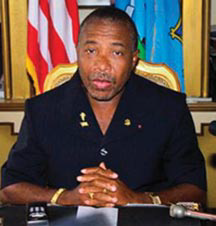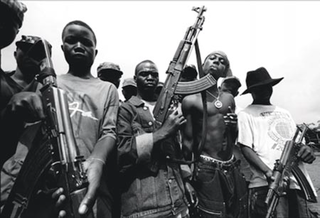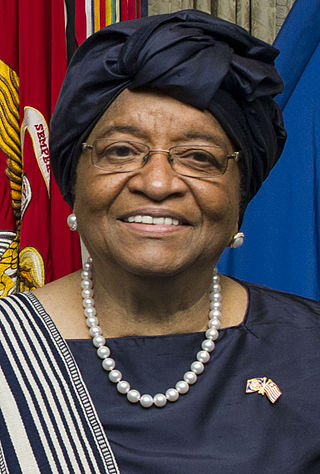Related Research Articles

Liberia, officially the Republic of Liberia, is a country on the West African coast. It is bordered by Sierra Leone to its northwest, Guinea to its north, Ivory Coast to its east, and the Atlantic Ocean to its south and southwest. It has a population of around 5 million and covers an area of 43,000 square miles (111,369 km2). The country's official language is English; however, over 20 indigenous languages are spoken, reflecting the country's ethnic and cultural diversity. The capital and largest city is Monrovia.

Liberia is a country in West Africa founded by free people of color from the United States. The emigration of African Americans, both freeborn and recently emancipated, was funded and organized by the American Colonization Society (ACS). The mortality rate of these settlers was the highest among settlements reported with modern recordkeeping. Of the 4,571 emigrants who arrived in Liberia between 1820 and 1843, only 1,819 survived (39.8%).

Charles McArthur Ghankay Taylor is a Liberian former politician and convicted war criminal who served as the 22nd president of Liberia from 2 August 1997 until his resignation on 11 August 2003 as a result of the Second Liberian Civil War and growing international pressure.

The president of the Republic of Liberia is the head of state and government of Liberia. The president serves as the leader of the executive branch and as commander-in-chief of the Armed Forces of Liberia.

The First Liberian Civil War was the first in a series of two civil wars within the West African nation of Liberia. It lasted from 1989 to 1997. President Samuel Doe established a regime in 1980 but totalitarianism and corruption led to unpopularity and the withdrawal of support from the United States by the late 1980s. The National Patriotic Front of Liberia (NPFL) led by Charles Taylor invaded Liberia from the Ivory Coast to overthrow Doe in December 1989 and gained control over most of the country within a year. Doe was captured and executed by the Independent National Patriotic Front of Liberia (INPFL), a splinter faction of the NPFL led by Prince Johnson, in September 1990. The NPFL and INPFL fought each other for control of the capital city, Monrovia and against the Armed Forces of Liberia and pro-Doe United Liberation Movement of Liberia for Democracy. Peace negotiations and foreign involvement led to a ceasefire in 1995 but fighting continued until a peace agreement between the main factions occurred in August 1996. Taylor was elected President of Liberia following the 1997 Liberian general election and entered office in August of the same year.

The Second Liberian Civil War was a civil war in the West African nation of Liberia that lasted from 1999 to 2003.

General elections were held in Liberia on 19 July 1997 as part of the 1996 peace agreement ending the First Liberian Civil War. The presidency, as well as all seats in the House of Representatives and the Senate were up for election. Voter turnout was around 89%. Former rebel leader Charles Taylor and his National Patriotic Party (NPP) won the election with 75.3% of the vote, giving it about three-quarters of the legislative seats according to the proportional representation system. Taylor was inaugurated as president on 2 August 1997.
The National Patriotic Front of Liberia (NPFL) was a Liberian rebel group that initiated and participated in the First Liberian Civil War from 24 December 1989 – 2 August 1997. The NPFL emerged out of rising ethnic tensions and civil unrest due to the Liberian government that was characterized by totalitarianism, corruption, and favoritism towards ethnic Krahns. The NPFL invaded Liberia through Ivory Coast’s border with Nimba County in Liberia under the direction of Charles Taylor, a former Liberian politician and guerrilla leader who served as the 22nd president of Liberia from 2 August 1997 until his resignation on 11 August 2003.

Ellen Johnson Sirleaf is a Liberian politician who served as the 24th president of Liberia from 2006 to 2018. Sirleaf was the first elected female head of state in Africa.
Henry Boimah Fahnbulleh, Jr. is a Liberian politician and diplomat. He most recently served in the Liberian Government as National Security Advisor in the Ellen Johnson Sirleaf administration. Immediately previous to his appointment as National Security Advisor, he served as Advisor on International Affairs in the same government. He served as Foreign Minister from 1981 to 1983 under President Samuel Doe.

The Liberian Truth and Reconciliation Commission (TRC) is a Parliament-enacted organization created in May 2005 under the Transitional Government. The Commission worked throughout the first mandate of Ellen Johnson Sirleaf after she was election President of Liberia in November 2005. The Liberian TRC came to a conclusion in 2010, filing a final report and recommending relevant actions by national authorities to ensure responsibility and reparations.
The Iron Ladies of Liberia (2007) is an independently produced documentary film that gives behind-the-scenes access to President Ellen Johnson Sirleaf's first year in government. Johnson-Sirleaf is Africa's first female president.

Jucontee Thomas Woewiyu, also known as Tom Woewiyu or Thomas Smith, was the former leader of the National Patriotic Front of Liberia (NPFL), with Charles Taylor.
Dorothy Harriet Eugenia Musuleng Cooper was a Liberian educator, politician and the first woman to serve as Foreign Minister in Liberia. She was born at Arthington, Liberia and obtained her B.S. and M.S. from College of West Africa and San Francisco State University respectively. She worked as a school teacher between graduation and high school and matriculation in 1964 in San Francisco in 1964, curriculum development in the Ministry of Education, and principal of Cuttington University College. She was an education minister in Charles Taylor's shadow government from 1990 to 1993 in the National Patriotic Reconstruction Assembly Government
The Press Union of Liberia was founded on September 30, 1964, by a group of independent journalists. It serves as an umbrella organization for media professionals and institutions to advocate for press freedom and the legal protection of journalists.
Grace Beatrice Minor is an Americo-Liberian politician who served as the first female President Pro Tempore of the Senate from 2002 to 2003. She was senator for Montserrado County. Minor was a close ally of president Charles Taylor.

Liberia–Libya relations have historically revolved around the respective policies of Libya and the Republic of Liberia toward external influence in Africa. This history is in large part founded in Liberia's commitments to its original sponsor, the United States, and the pan-African unity ambitions of Libyan despot Muammar Gaddafi. Gaddafi initially welcomed the overthrow of the longstanding Americo-Liberian regime by Samuel Doe but then also supported Charles Taylor in launching a civil war against Doe. Each country maintains an embassy in the other's capital.

Major General Prince C. Johnson III is a Liberian military officer. As of 2019, he served as Chief of Staff of the Armed Forces of Liberia.

The Liberia national transitional government was a provisional government, or rather the name given to three successive governments, in Liberia formed in the midst of the First Liberian Civil War. The LNTG was product of the July 25, 1993, Cotonou Peace Accord, whereby the Interim Government of National Unity disbanded. The respective LNTG-I, LNTG-II and LNTG-III governments were differentiated by being led by three different chairpersons. Initially supposed to last for six months to allow for disarmament of warring factions and preparations of national elections, the LNTG timeline lasted until mid-1997. Various of the warring factions had direct participation in the LNTG and civilian elements were gradually sidelined. Through participation in the provisional governance of LNTG the different warlords could gain access to state resources, even in situations when armed hostilities continued. The LNTG period ended with the 1997 Liberian general election whereby Charles Taylor was elected President of Liberia.
References
- ↑ United States. Foreign Broadcast Information Service (1993). Daily Report: People's Republic of China. National Technical Information Service.
- ↑ Klaus Schlichte (5 December 2016). The Dynamics of States: The Formation and Crises of State Domination. Taylor & Francis. p. 123. ISBN 978-1-351-89128-8.
- ↑ Abiodun Alao (5 July 2017). The Burden of Collective Goodwill: The International Involvement in the Liberian Civil War. Taylor & Francis. pp. 109, 127. ISBN 978-1-351-89345-9.
- ↑ Los Angeles Times. Post-Civil War Liberia Takes Shape
- ↑ United Nations. INTERNATIONAL COMMUNITY MUST NOT MAKE LIBERIA ANOTHER ORPHAN IN QUE
- ↑ Elwood D. Dunn; Amos J. Beyan; Carl Patrick Burrowes (20 December 2000). Historical Dictionary of Liberia. Scarecrow Press. p. 317. ISBN 978-1-4616-5931-0.
- Reuters (1995-09-03). "Taylor Loyalists Get Top Liberian Government Posts". South Florida Sun - Sentinel. p. 18.A. Retrieved 2010-11-06.
Chief foreign spokesman Momolu Sirleaf becomes foreign minister, ...
{{cite web}}:|author=has generic name (help)